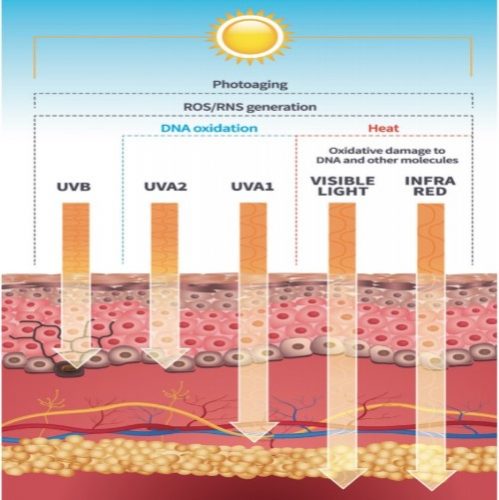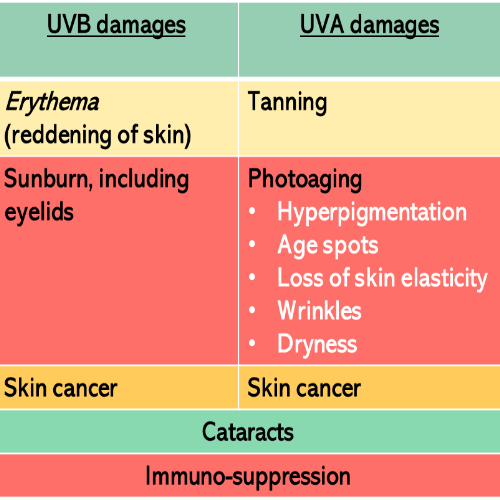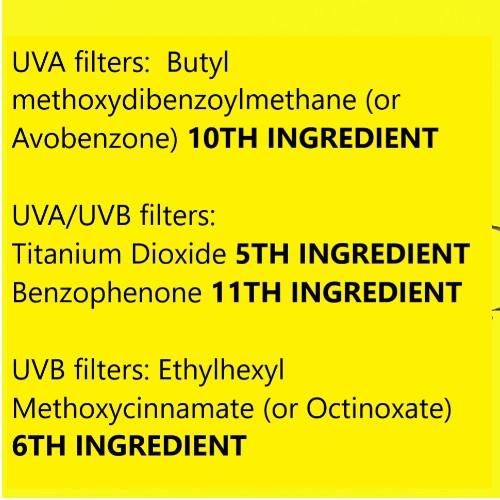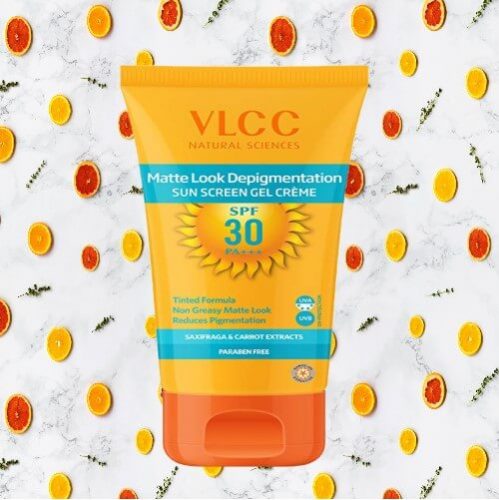My view: This is a sunscreen formulation that does not get the textbook stuff correct. You don’t need to use it.
Without further ado, we want a sunscreen to protect against UVA and UVB rays.

BOTH UVA and UVB have been implicated in the following:
- Skin cancer
- Photoaging
- Immuno-suppression
- Cataracts
This is important because sunscreens must protect against both UVA and UVB damage. Second sun-damage is cumulative, so you should not wait till your 50 to use sunscreen. Generally speaking we associate the following harmful effects of UVA and UVB:

We want sunscreens to have ” UV FILTERS” that protect against UVA, UVB or both (UVB/UVA filters).
The UV filters present in this product are:

I can be sure that this product is an SPF 30 because there is sufficient quantity of UVB filters.
The problem child is always UVA filters.
The UVA filter mess in this product
The primary UVA filter here is Titanium Dioxide ( because there is more of it). In my post on Clinique, I have written extensively on how Titanium Dioxide is simply a more efficient UVB filter. Please read this post for more details.
Otherwise take my word that if the primary UVA filter is Titanium Dioxide, then you don’t need to buy the product. You have options. See Top 5 sunscreen recommendations.
Moving on.
The secondary UVA filter is Avobenzone. Avobenzone is without doubt a gold standard UVA filter – but NOT:
- When its present in insufficient quantities – come on VLCC – seriously, the 10th ingredient??
- When the photostability of Avobenzone is in question…..
Avobenzone is notoriously photounstable. But its stabilised here by (what I assume) is Benzophenone-3 (the label says “Benzophenone”). That works. Except the product also has Octinoxate and Titanium Dioxide. Both make Avobenzone photounstable and they are both present in greater quantities then Avobenzone.
This makes UVA protection borderline useless. Why is VLCC asking us to waste our money??
Click on LINK for more information.
In fact, this very instability is why you don’t see American sunscreens – which use Avobenzone a lot – contain Octinoxate or Titanium Dioxide.
Harmful chemicals present
The label reads “Benzophenone” which I assume from all the other VLCC formulations is Benzophenone-3. All VLCC sunscreen products have almost identical ingredient lists and it beggars belief that this is not Benzophenone-3.
Oxybenzone is likely an endocrine disruptor and is a known skin allergen. Its a harmful chemical that I point readers away from.
Closing remarks
This is a sunscreen formulation that does not get the textbook stuff correct. You don’t need to use it.
Drop me a line if you have any queries at email@happyskindays.com
See also: Top 5 sunscreen recommendations, Do You Understand The Gibberish On Sunscreen Labels? Myths About Sun-Protection
Skincare Nerd Edit: a quick note on Oxybenzone
Oxybenzone as a filter
Oxybenzone (or Benzophenone-3) is a broad band UV filter that absorbs both UVB and UVA. The health concerns around this chemical are:
1. Endocrine disruptors: Oxybenzone has been found in the urine samples of 90%+ Americans (men and women, with a higher concentration in women (likely to be because women use higher levels of personal care products). Its also been found in the breast milk of lactating women and high levels of oxybenzone have been associated with girls with LOWER weights at birth and boys with larger heads: in all likelihood, Oxybenzone causes endocrine disruption.
2. Skin allergen: If Oxybenzone is absorbed so readily in the skin, it shouldn’t come as a surprise to anyone that Oxybenzone is also an allergen for people with pre-existing skin conditions.
See also Chemicals To Avoid – Benzophenone-3
Sources and uses:
US20170326062A1 (US Patent application pending),
US9956163B2 (Having previously been published, pre-grant publication);
Ceresole, R., Y.K. Han, M.A. Rosasco, et al., “Drug-Excipient Compatibility Studies in Binary Mixtures of Avobenzone,” Journal of Cosmetic Science, vol. 64(5), pp. 317-328, 2013. ;
Nash, J.F., and P.R. Tanner, “Relevance of UV Filter/Sunscreen Product Photostability to Human Safety,” Photodermatology, Photoimmunology and Photomedicine, vol. 30(2-3), pp. 88-95, 2014 ;
Wendy E Roberts, Lily I Jiang, and James H Herndon, Jr, “Facial primer provides immediate and long-term improvements in mild-to-moderate facial hyperpigmentation and fine lines associated with photoaging” Clin Cosmet Investig Dermatol. 2015; 8: 471–477.
